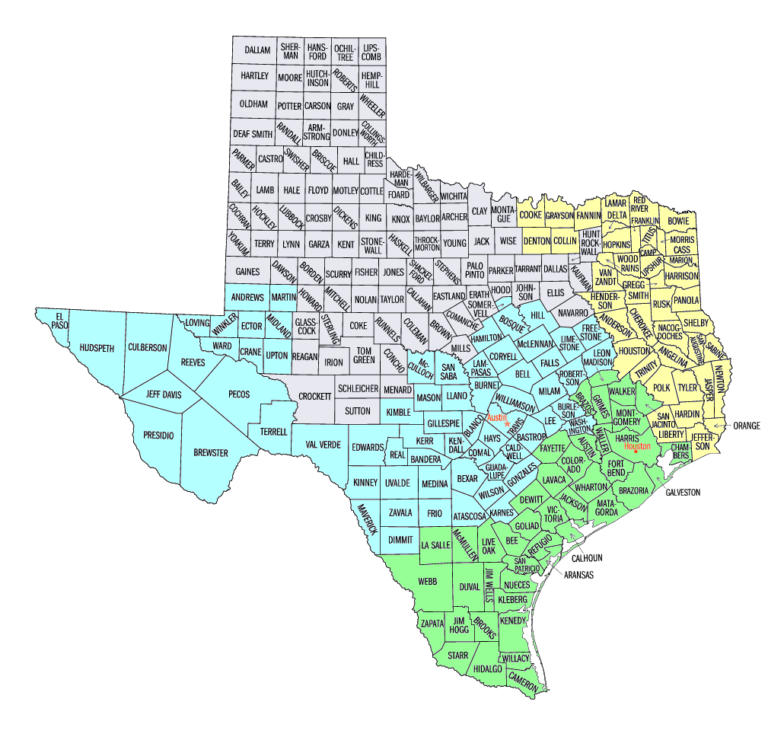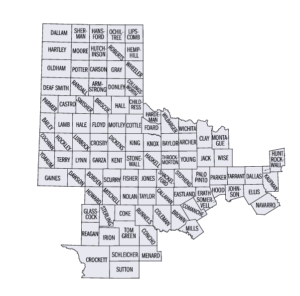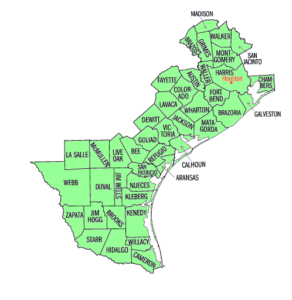Texas Federal Districts:
Northern, Western, Eastern, and Southern
Below you will find information on standard conditions of supervision and travel restrictions, as well as sex offender registry requirements.
Always follow the conditions and restrictions given to you by your U.S. Probation Officer.

Select your district below:
Standard Conditions of Supervision
- You must report to the probation office in the federal judicial district where you are authorized to reside within 72 hours of the time you were sentenced or released from imprisonment, unless the probation officer instructs you to report to a different probation office or within a different time frame.
- After initially reporting to the probation office, you will receive instructions from the court or the probation officer about how and when you must report to the probation officer, and you must report to the probation officer as instructed.
- You must not knowingly leave the federal judicial district where you are authorized to reside without first getting permission from the court or the probation officer.
- You must answer truthfully the questions asked by your probation officer.
- You must live at a place approved by the probation officer. If you plan to change where you live or anything about your living arrangements (such as the people you live with), you must notify the probation officer at least 10 days before the change. If notifying the probation officer in advance is not possible due to unanticipated circumstances, you must notify the probation officer within 72 hours of becoming aware of a change or expected change.
- You must allow the probation officer to visit you at any time at your home or elsewhere, and you must permit the probation officer to take any items prohibited by the conditions of your supervision that he or she observes in plain view.
- You must work full time (at least 30 hours per week) at a lawful type of employment, unless the probation officer excuses you from doing so. If you do not have full-time employment you must try to find full-time employment, unless the probation officer excuses you from doing so. If you plan to change where you work or anything about your work (such as your position or your job responsibilities), you must notify the probation officer at least 10 days before the change. If notifying the probation officer at least 10 days in advance is not possible due to unanticipated circumstances, you must notify the probation officer within 72 hours of becoming aware of a change or expected change.
- You must not communicate or interact with someone you know is engaged in criminal activity. If you know someone has been convicted of a felony, you must not knowingly communicate or interact with that person without first getting the permission of the probation officer.
- If you are arrested or questioned by a law enforcement officer, you must notify the probation officer within 72 hours.
*Potential Sex Offender Special Conditions of Supervision
*Supervision of sex offenders is individualized based on risk factors, offense conduct, and prior criminal history.
- The defendant shall participate in sex offender treatment services as directed by the probation officer until successfully discharged. These services may include psycho-physiological testing (i.e. clinical polygraph, plethysmograph, and the ABEL screen) to monitor the defendant’s compliance, treatment progress, and risk to the community. The defendant shall contribute to the costs of services rendered (copayment) at a rate of at least ___ per month.
- The defendant shall have no contact with persons under the age of 18, including by correspondence, telephone, internet, electronic communication, or through third parties. The defendant also shall not have access to or loiter near school grounds, parks, arcades, playgrounds, amusement parks or other places where children may frequently congregate.
- The defendant shall neither seek nor maintain employment or volunteer work at any location and/or activity where persons under the age of 18 congregate, without prior permission of the probation officer. Furthermore, the defendant shall not date or befriend anyone who has children under the age of 18, without prior permission of the probation officer.
- The defendant shall neither possess nor have under his/her control any sexually oriented, or sexually stimulating materials of adults or children. This may include visual, auditory, telephonic, electronic media, email, chat communications, instant messaging, or computer programs. The defendant shall not patronize any place where such material or entertainment is available. The defendant shall not use any sex-related telephone numbers.
- The defendant shall have no contact with the victim(s), including by correspondence, telephone, or communication through third parties, except under circumstances approved in advance by the probation officer. The defendant shall not enter onto the premises, travel past, or loiter near the victim’s residence, place of employment, or other places frequented by the victim.
- The defendant shall register with state and local law enforcement as directed by the probation officer in each jurisdiction where the defendant resides, is employed, and is a student. The defendant shall provide all information required in accordance with state registration guidelines. Initial registration shall be completed within 3 business days after ___________.
- The defendant shall provide written verification of registration to the probation officer within 3 business days following registration. This registration shall be renewed as required by the defendant’s assigned tier. The defendant shall, no later than 3 business days after each change of name, residence, employment, or student status, appear in person in at least one jurisdiction and inform that jurisdiction of all changes in the information required in the sex offender registry.
- The defendant shall obtain approval of the U.S. Probation Officer prior to a change in residence or living situation.
- The defendant shall submit a blood sample as directed by the U.S. Probation Officer, to be included in the State Sex Offender DNA Data Bank. The defendant shall pay for the costs of such services.
- The defendant shall not have any form of unsupervised contact with persons under the age of 18 at any location, including but not limited to, the defendant’s residence, place of employment, and public places where minors frequent or congregate, without prior permission of the Probation Officer.
Travel Restrictions
The Northern District of Texas comprises 100 counties. You are allowed to travel freely within these 100 counties. Unless you are given permission in advance by the judge in your case, any requests to travel outside of these 100 counties must be approved in advance by your U.S. Probation Officer.
Failure to do so may result in a violation of your supervision.
For more information visit the links below:
Mandatory Conditions of Supervision
- The defendant shall not commit another federal, state, or local crime.
- The defendant shall not lawfully possess a controlled substance. The defendant shall refrain from any unlawful use of a controlled substance. The defendant shall submit to one drug test within 15 days of release from imprisonment and at least two periodic drug tests thereafter, as determined by the court.
- In supervised release cases only, the defendant must report to the probation office in the district to which the defendant is released within 72 hours of release from custody of the Bureau of Prisons.
- If convicted of a felony, the defendant shall not possess a firearm, ammunition, destructive device, or any other dangerous weapon.
- The defendant shall cooperate in the collection of DNA as directed by the probation officer if the collection of such a sample is authorized pursuant to section 3 of the DNA Analysis Backlog Elimination Act of 200 (42 USC § 1413a).
- If convicted of a sexual offense as described in 18 USC § 1402(c)(4), the defendant shall register with the state sex offender registration agency in the state where the defendant resides, works, or is a student, as directed by the probation officer.
- If convicted of a domestic violence crime as defined in 18 USC § 3561(b), the defendant shall participate in an approval program for domestic violence.
- If the judgement imposes a fine or restitution, it is a condition of supervision that the defendant pays in accordance with the schedule of payments sheet of the judgement.
Standard Conditions of Supervision
- The defendant shall not leave the judicial district without permission of the court or probation officer.
- The defendant shall report to the probation officer and shall submit a truthful and complete written report within the first five days of each month.
- The defendant shall answer truthfully all inquiries by the probation officer and follow the instructions of the probation officer.
- The defendant shall support his or her dependents and meet other family responsibilities.
- The defendant shall work regularly at a lawful occupation, unless excused by the probation officer for schooling, training, or other acceptable reasons.
- The defendant shall notify the probation officer at least ten days prior to any change in residence or employment.
- The defendant shall refrain from excessive use of alcohol and shall not purchase, possess, use, distribute, or administer any controlled substance or any paraphernalia related to any controlled substances, except as prescribed by a physician.
- The defendant shall not frequent places where controlled substances are: illegally sold, used, distributed, or administered.
- The defendant shall not associate with any persons engaged in criminal activity and shall not associate with any person convicted of a felony, unless granted permission to do so by the probation officer.
- The defendant shall permit a probation officer to visit him or her at any time at home or elsewhere and shall permit confiscation of any contraband observed in plain view of the probation officer.
- The defendant shall notify the probation officer within seventy-two hours of being arrested or questioned by a law enforcement officer
- The defendant shall not enter into any agreement to act as an informer or. a special agent ofa law enforcement agency without the permission of the court.
- As directed by the probation officer, the defendant shall notify third parties of risks that may be occasioned by the defendant’s criminal record or personal history or characteristics and shall permit the probation officer to make such notifications and to confirm the defendant’s compliance with such notification requirement.
- If convicted of a sexual offense as described in 18 USC § 4024(c)(4), or has prior conviction of state or local offense that would have been an offense as described in 18 USC § 4024(c)(4) if a circumstance giving rise to federal jurisdiction had existed, the defendant shall participate in a sex offender treatment program approved by the probation officer. The defendant shall abide by all program rules, requirements and conditions of the sex offender treatment program, including submission to polygraph testing, to determine if the defendant is in compliance with the conditions of release. The defendant may be required to contribute to the cost of the services rendered (copayment) in an amount to be determined by the probation officer, based on the defendant’s ability to pay.
- The defendant shall submit to an evaluation for substance abuse or dependency treatment as directed by the probation officer, and if deemed necessary by the probation officer, the defendant shall participate in a program approved by the probation officer treatment of narcotic addiction or drug or alcohol dependency which may include testing and examination to determine if the defendant reverted to the use of drugs or alcohol. The defendant may be required if the defendant has reverted to the use of drugs or alcohol. The defendant may be required to contribute to the cost of the services rendered (copayment) in an amount to be determined by the probation officer, based upon the defendant’s ability to pay.
- The defendant shall submit to an evaluation for mental health counseling as directed by the probation officer, and if deemed necessary by the probation officer, the defendant shall participate in a mental health program approved by the probation officer. The defendant may be required to contribute to the cost of the services rendered (copayment) in an amount to be determined by the probation officer, based upon the defendant’s ability to pay.
- If the defendant is excluded, deported, or removed upon release from imprisonment, the term of supervised release shall be a non-reporting term of supervised release. The defendant shall not illegally re-enter the United States. If the defendant lawfully renters the United States during the term of supervised release, the defendant shall immediately report in person to the nearest probation office.
- If the judgement imposes other criminal monetary penalties, it is a condition of supervision that the defendant pay such penalties in accordance with the schedule of payments sheet of the judgement.
- If the judgement imposes a fine, special assessment, restitution, or other criminal monetary penalties, it is a condition of supervision that the defendant shall provide the probation officer access to any requested financial information.
- If the judgement imposes a fine, special assessment, restitution, or other criminal monetary penalties, it is a condition of supervision that the defendant shall not incur any new credit charges or open additional lines of credit without the approval of the probation officer unless the defendant is in compliance with the payment schedule.
Travel Restrictions
The Western District of Texas comprises 68 counties. You are allowed to travel freely within these 68 counties. Unless you are given permission in advance by the judge in your case, any requests to travel outside of these 68 counties must be approved in advance by your U.S. Probation Officer.
Failure to do so may result in a violation of your supervision.
For more information visit the links below:
Standard Conditions of Supervision
These are the standard conditions of supervision or probation the Court must impose. This does not include special conditions the court may impose.
- The defendant shall not leave the judicial district without the permission of the court or probation officer.
- The defendant shall report to the probation officer in a manner and frequency directed by the court or probation officer.
- The defendant shall answer truthfully all inquiries by the probation officer and follow the instructions of the probation officer.
- The defendant shall support his or her dependents and meet other family responsibilities.
- The defendant shall work regularly at a lawful occupation unless excused by the probation officer for schooling, training, or other acceptable reasons.
- The defendant shall notify the probation officer at least ten days prior to any change in residence or employment.
- The defendant shall refrain from excessive use of alcohol and shall not purchase, possess, use, distribute, or administer any controlled substance or any paraphernalia related to any controlled substance, except as prescribed by a physician.
- The defendant shall not frequent places where controlled substances are illegally sold, used, distributed, or administered.
- The defendant shall not associate with any persons engaged in criminal activity and shall not associate with any person convicted of a felony, unless granted permission to do so by the probation officer.
- The defendant shall permit a probation officer to visit him or her at any time at home or elsewhere and shall permit confiscation of any contraband observed in plain view of the probation officer.
- The defendant shall notify the probation officer within 72 hours of being arrested or questioned by a law enforcement officer.
- The defendant shall not enter into any agreement to act as an informer or a special agent of a law enforcement agency without the permission of the court.
- As directed by the probation officer, the defendant shall notify third parties of risks due to the defendant’s criminal record or personal history or characteristics and shall permit the probation officer to make such notifications and to the defendant’s compliance with such notification requirements.
Travel Restrictions
The Eastern District of Texas comprises 43 counties. You are allowed to travel freely within these 43 counties. Unless you are given permission in advance by the judge in your case, any requests to travel outside of these 43 counties must be approved in advance by your U.S. Probation Officer.
Failure to do so may result in a violation of your supervision.Requests to travel anywhere outside of the judicial district must be approved in advance by your U.S. Probation Officer. Failure to do so may result in a violation of your supervision. All requests for international/out of country travel must be submitted to your supervising officer well in advance of the requested travel dates. It is strongly recommended that such a request be submitted at least 30 days prior to the proposed travel date, as the sentencing judge has the final authority to approve/deny international/out of country travel. Hence, a request for such travel should be submitted as early as possible.
To travel outside of the United States a passport is required. With a passport a convicted felon can travel outside the country. However, some countries have laws in place that prohibit felons from visiting; e.g., Japan, Canada, and Australia. To find out if you are able to visit a country with a felony conviction, please contact the country’s consulate or embassy. These can generally be found online or if an individual is prohibited computer usage, they can contact the embassy of the country through written correspondence.
For more information visit the links below:
Mandatory Conditions of Supervision
- You must not commit another federal, state or local crime.
- You must not unlawfully possess a controlled substance.
- You must refrain from any unlawful use of a controlled substance. You must submit to one drug test within 15 days of release from imprisonment and at least two periodic drug tests thereafter, as determined by the court. □ The above drug testing condition is suspended, based on the court’s determination that you pose a low risk of future substance abuse. (check if applicable)
- □ You must make restitution in accordance with 18 U.S.C. §§ 3663 and 3663A or any other statute authorizing a sentence of restitution. (check if applicable)
- □ You must cooperate in the collection of DNA as directed by the probation officer. (check if applicable)
- □ You must comply with the requirements of the Sex Offender Registration and Notification Act (34 U.S.C. § 20901, et seq.) as directed by the probation officer, the Bureau of Prisons, or any state sex offender registration agency in which you reside, work, are a student, or were convicted of a qualifying offense. (check if applicable)
- □ You must participate in an approved program for domestic violence. (check if applicable)
Standard Conditions of Supervision
- You must report to the probation office in the federal judicial district where you are authorized to reside within 72 hours of your release from imprisonment, unless the probation officer instructs you to report to a different probation office or within a different time frame.
- After initially reporting to the probation office, you will receive instructions from the court or the probation officer about how and when you must report to the probation officer, and you must report to the probation officer as instructed.
- You must not knowingly leave the federal judicial district where you are authorized to reside without first getting permission from the court or the probation officer.
- You must answer truthfully the questions asked by your probation officer.
- You must live at a place approved by the probation officer. If you plan to change where you live or anything about your living arrangements (such as the people you live with), you must notify the probation officer at least 10 days before the change. If notifying the probation officer in advance is not possible due to unanticipated circumstances, you must notify the probation officer within 72 hours of becoming aware of a change or expected change.
- You must allow the probation officer to visit you at any time at your home or elsewhere, and you must permit the probation officer to take any items prohibited by the conditions of your supervision that he or she observes in plain view.
- You must work full time (at least 30 hours per week) at a lawful type of employment, unless the probation officer excuses you from doing so. If you do not have full-time employment you must try to find full-time employment, unless the probation officer excuses you from doing so. If you plan to change where you work or anything about your work (such as your position or your job responsibilities), you must notify the probation officer at least 10 days before the change. If notifying the probation officer at least 10 days in advance is not possible due to unanticipated circumstances, you must notify the probation officer within 72 hours of becoming aware of a change or expected change.
- You must not communicate or interact with someone you know is engaged in criminal activity. If you know someone has been convicted of a felony, you must not knowingly communicate or interact with that person without first getting the permission of the probation officer.
- If you are arrested or questioned by a law enforcement officer, you must notify the probation officer within 72 hours.
- You must not own, possess, or have access to a firearm, ammunition, destructive device, or dangerous weapon (i.e., anything that was designed, or was modified for, the specific purpose of causing bodily injury or death to another person such as nunchakus or tasers).
- You must not act or make any agreement with a law enforcement agency to act as a confidential human source or informant without first getting the permission of the court.
- If the probation officer determines that you pose a risk to another person (including an organization), the probation officer may require you to notify the person about the risk and you must comply with that instruction. The probation officer may contact the person and confirm that you have notified the person about the risk.
- You must follow the instructions of the probation officer related to the conditions of supervision.
- If restitution is ordered, the defendant must make restitution as ordered by the Judge and in accordance with the applicable provisions of 18 U.S.C. §§ 2248, 2259, 2264, 2327, 3663A and/or 3664. The defendant must also pay the assessment imposed in accordance with 18 U.S.C. § 3013.
- The defendant must notify the U.S. Probation Office of any material change in the defendant’s economic circumstances that might affect the defendant’s ability to pay restitution, fines, or special assessments.
Travel Restrictions
The Southern District of Texas comprises 43 counties. You are allowed to travel freely within these 43 counties. Unless you are given permission in advance by the judge in your case, any requests to travel outside of these 43 counties must be approved in advance by your U.S. Probation Officer.
Failure to do so may result in a violation of your supervision.
For more information visit the links below:
What is the sex offender registry?
What is the Sex Offender Registry?
Every state and U.S. territory requires those convicted of sex offenses to be added to a registry to be monitored and tracked after their release back into the community. Information about the offender is collected and shared with local and federal authorities, as well as the general public. Requirements and restrictions are often placed on registered sex offenders. That registration process is unique in each state and U.S. territory.

What is SORNA?
The Sex Offender Registration and Notification Act (SORNA) was passed in 2006 as part of the Adam Walsh Child Protection and Safety Act to provide federal standards for jurisdictions to follow. SORNA calls for states and U.S. territories to meet minimum requirements for sex offender registration and notification.
Why Are the Requirements for Sex Offender Registration Different Everywhere?
While SORNA’s guidelines streamlined registration and notification requirements across the country, these requirements are far from uniform. Each jurisdiction determines the details of their own registration process. This leaves a patchwork of rules for sex offenders that vary widely depending on where a registrant lives or works.
Where PIN Comes In
Probation Information Network developed a list of questions regarding the sex offender registration requirements across the country. These are questions that might concern the public, victims and their advocates, or those who are facing registration or are currently registered and their loved ones. We then searched the statutes or code of each jurisdiction for the laws surrounding sex offender registration and notification. Where necessary, we consulted with the law enforcement agency in charge of the jurisdiction’s registry to provide clear and concise answers to the following questions:
- What is the duration of registration?
How long must a sex offender remain on the registry? The length of time a sex offender must comply with registration requirements varies widely depending on the jurisdiction where the registrant lives, and the level of the offense committed. All but 2 jurisdictions offer a path for eventual removal from the registry for at least some of their registrants.
- Must the immediate community be notified directly, either by the offender or law enforcement?
Every jurisdiction has passive community notification in the form of a public sex offender registry website. Concerned citizens are free to search the website and can sign up for email notifications if a sex offender moves into their neighborhood. Some jurisdictions go even further and require active notification, where either law enforcement or the offender themselves is required to directly notify the immediate community that a sex offender is in the area. This can take many forms, including electronic, mail, or in-person notification, publication in local newspapers, and community meetings.
- What are the residence distance restrictions?
Are there any restrictions on where a registered sex offender can live? Some jurisdictions restrict registrants from living within a measured distance of certain places. This restriction could be for all registrants, or only for higher-level offenders or those under supervision. Some jurisdictions do not have a state-wide restriction but do allow local jurisdictions to enact their own.
- What are the employment distance restrictions?
Registered sex offenders are usually restricted from certain types of employment, and from working at establishments that specifically cater to minors. Some jurisdictions go even further and restrict registrants from working within a measured distance of certain places.
- Is an employer’s information included on the public registry?
Returning citizens of every type need to find employment upon reentry, and sex offenders are no exception. Some jurisdictions include registrants’ employment information on the public registry website. This could be the employer’s address or in some cases the name of the employer.
- Are online identifiers included on the public registry?
Some jurisdictions require registered sex offenders to report any identifiers they use online, such as email addresses and social media user names. In some jurisdictions that information is included on the public registry website, separate from the registrant’s profile, in a feature that allows the public to search by specific identifiers.
- Is a state-issued ID required to be labeled?
Some jurisdictions require a state-issued ID, such as a driver’s license, to be labeled to identify the holder as a registered sex offender. This label could be the words “Sex Offender” printed on the ID in a prominent place or a more subtle designation known to law enforcement.
- What is the cost of registration?
Is there a fee to register as a sex offender? Some jurisdictions pass on some of their administrative costs to the registrants. This could be a one-time fee paid only upon initial registration, or an ongoing fee paid annually or quarterly. Some jurisdictions charge a fee every time a registrant updates their information.
- How long can a registrant be in the state for work or education before registration is required?
Does a sex offender have to register if they work or go to school in a different state? It depends on the state, and how long the registrant will be there. Some jurisdictions require registrants to notify authorities immediately, while others allow limited stays without requiring registration. Registrants currently under supervision usually need permission from their Parole or Probation Officer before traveling and should always consult their supervising officer.
- How long can a registrant visit the state before registration is required?
Can a registered sex offender go on vacation? Does a sex offender have to register if they visit a different state? It depends on the state, and how long the registrant will be there. Some jurisdictions require registrants to notify authorities immediately, while others allow limited stays without requiring registration. Registrants currently under supervision usually need permission from their Parole or Probation Officer before traveling and should always consult their supervising officer.
The answers provided are taken directly from the laws found on the state or territory’s legislative website or, where necessary, from the website of the law enforcement agency in charge of the jurisdiction’s registry. In some cases, we contacted state or territory officials for clarification and have directly quoted those conversations.
Disclaimer
While we stand by our research, it is for informational purposes only. It should not be considered legal advice and, while we strive to provide accurate and up to date information, it is not guaranteed to be complete or correct. We provide links to each jurisdiction’s legislative and law enforcement websites and maintain a directory of lawyers who specialize in sex offender registration laws. For those currently under supervision, consult with your Parole or Probation Officer for guidance.
What is the duration of registration?
TX Code Crim Pro Art. 62.101 EXPIRATION OF DUTY TO REGISTER.
(a) Except as provided by Subsection (b) and Subchapter I, the duty to register for a person ends when the person dies if the person has a reportable conviction or adjudication, other than an adjudication of delinquent conduct, for:
(1) a sexually violent offense;
(2) an offense under Section 20A.02(a)(3), (4), (7), or (8), 25.02, 43.05(a)(2), or 43.26, Penal Code;
(3) an offense under Section 20A.03, Penal Code, if based partly or wholly on conduct that constitutes an offense under Section 20A.02(a)(3), (4), (7), or (8) of that code;
(4) an offense under Section 21.11(a)(2), Penal Code, if before or after the person is convicted or adjudicated for the offense under Section 21.11(a)(2), Penal Code, the person receives or has received another reportable conviction or adjudication, other than an adjudication of delinquent conduct, for an offense or conduct that requires registration under this chapter;
(5) an offense under Section 20.02, 20.03, or 20.04, Penal Code, if:
(A) the judgment in the case contains an affirmative finding under Article 42.015 or, for a deferred adjudication, the papers in the case contain an affirmative finding that the victim or intended victim was younger than 17 years of age; and
(B) before or after the person is convicted or adjudicated for the offense under Section 20.02, 20.03, or 20.04, Penal Code, the person receives or has received another reportable conviction or adjudication, other than an adjudication of delinquent conduct, for an offense or conduct that requires registration under this chapter; or
(6) an offense under Section 43.23, Penal Code, that is punishable under Subsection (h) of that section.
(b) Except as provided by Subchapter I, the duty to register for a person otherwise subject to Subsection (a) ends on the 10th anniversary of the date on which the person is released from a penal institution or discharges community supervision or the court dismisses the criminal proceedings against the person and discharges the person, whichever date is later, if the person’s duty to register is based on a conviction or an order of deferred adjudication in a cause that was transferred to a district court or criminal district court under Section 54.02, Family Code.
(c) Except as provided by Subchapter I, the duty to register for a person with a reportable conviction or adjudication for an offense other than an offense described by Subsection (a) ends:
(1) if the person’s duty to register is based on an adjudication of delinquent conduct, on the 10th anniversary of the date on which the disposition is made or the person completes the terms of the disposition, whichever date is later; or
(2) if the person’s duty to register is based on a conviction or on an order of deferred adjudication, on the 10th anniversary of the date on which the court dismisses the criminal proceedings against the person and discharges the person, the person is released from a penal institution, or the person discharges community supervision, whichever date is later.
Must the immediate community be notified directly, either by the offender or law enforcement?
TX Code Crim Pro Art. 62.056. ADDITIONAL PUBLIC NOTICE FOR CERTAIN OFFENDERS.
(a) On receipt of notice under this chapter that a person subject to registration is due to be released from a penal institution, has been placed on community supervision or juvenile probation, or intends to move to a new residence in this state, the department shall verify the person’s numeric risk level assigned under this chapter. If the person is assigned a numeric risk level of three, the department shall, not later than the seventh day after the date on which the person is released or the 10th day after the date on which the person moves, provide written notice mailed or delivered to at least each address, other than a post office box, within a one-mile radius, in an area that has not been subdivided, or a three-block area, in an area that has been subdivided, of the place where the person intends to reside. In providing written notice under this subsection, the department shall use employees of the department whose duties in providing the notice are in addition to the employees’ regular duties.
(b) The department shall provide the notice in English and Spanish and shall include in the notice any information that is public information under this chapter. The department may not include any information that is not public information under this chapter.
(c) The department shall establish procedures for a person with respect to whom notice is provided under Subsection (a), other than a person subject to registration on the basis of an adjudication of delinquent conduct, to pay to the department all costs incurred by the department in providing the notice. The person shall pay those costs in accordance with the procedures established under this subsection.
(d) On receipt of notice under this chapter that a person subject to registration under this chapter is required to register or verify registration with a local law enforcement authority and has been assigned a numeric risk level of three, the local law enforcement authority may provide notice to the public in any manner determined appropriate by the local law enforcement authority, including publishing notice in a newspaper or other periodical or circular in circulation in the area where the person intends to reside, holding a neighborhood meeting, posting notices in the area where the person intends to reside, distributing printed notices to area residents, or establishing a specialized local website. The local law enforcement authority may include in the notice only information that is public information under this chapter.
TX Code Crim Pro Art. 62.201. ADDITIONAL PUBLIC NOTICE FOR INDIVIDUALS SUBJECT TO CIVIL COMMITMENT.
(a) On receipt of notice under this chapter that a person subject to registration who is civilly committed as a sexually violent predator is due to be released from a penal institution or intends to move to a new residence in this state, the department shall, not later than the seventh day after the date on which the person is released or the seventh day after the date on which the person moves, provide written notice mailed or delivered to at least each address, other than a post office box, within a one-mile radius, in an area that has not been subdivided, or a three-block area, in an area that has been subdivided, of the place where the person intends to reside.
(b) The department shall provide the notice in English and Spanish and shall include in the notice any information that is public information under this chapter. The department may not include any information that is not public information under this chapter.
(c) The department shall establish procedures for a person with respect to whom notice is provided under this article to pay to the department all costs incurred by the department in providing the notice. The person shall pay those costs in accordance with the procedures established under this subsection.
(d) The department’s duty to provide notice under this article in regard to a particular person ends on the date on which a court releases the person from all requirements of the civil commitment process.
What are the residence distance restrictions?
TX Code Crim Pro Art. 62.064. PROHIBITED LOCATION OF RESIDENCE.
A person subject to registration under this chapter may not reside on the campus of a public or private institution of higher education unless:
(1) the person is assigned a numeric risk level of one based on an assessment conducted using the sex offender screening tool developed or selected under Article 62.007; and
(2) the institution approves the person to reside on the institution’s campus.
The registration law (Chapter 62, Texas Code of Criminal Procedure) is silent otherwise regarding residency restrictions on the basis of registration alone. Residency restrictions could be imposed if the registrant is under Probation or Parole and the judge or parole board imposes a restriction as a condition of supervision. Once registrants are no longer under Probation or Parole the restrictions are no longer in effect. In addition, some cities have enacted local city ordinances which may restrict where a sex offender may reside.
– Texas Department of Public Safety
What are the employment distance restrictions?
The Texas Sex Offender Registration Program itself does not prohibit registered sex offenders from working in certain trades, occupations or professions. However, state law regulating a particular trade, occupation or profession may bar sex offenders from working in the trade, profession or occupation. To determine if a registered sex offender is prohibited from working in a particular trade, occupation or profession, the law regulating the trade, occupation or profession must be reviewed. Furthermore, the following prohibition exists for certain sexually violent offenses pursuant to Texas Code of Criminal Procedure Ch. 62.063 where on or after September 1, 2013 an affirmative finding is made that a sexually violent offense had been committed on a victim younger than 14.
– Texas Department of Public Safety
TX Code Crim Pro Art. 62.063. PROHIBITED EMPLOYMENT.
(b) A person subject to registration under this chapter because of a reportable conviction or adjudication for which an affirmative finding is entered under Article 42.015(b) or 42A.105(a), as appropriate, may not, for compensation:
(1) operate or offer to operate a bus;
(2) provide or offer to provide a passenger taxicab or limousine transportation service;
(3) provide or offer to provide any type of service in the residence of another person unless the provision of service will be supervised; or
(4) operate or offer to operate any amusement ride.
Is an employer's information included on the public registry?
No.
TX Code Crim Pro Art 62.005.
(b) The information contained in the database, including the numeric risk level assigned to a person under this chapter, is public information, with the exception of any information:
(2) that is described by Article 62.051(c)(7) or required by the department under Article 62.051(c)(9), including any information regarding an employer’s name, address, or telephone number;
Are online identifiers included on the public registry?
While offenders must register any online identifier [TX Code Crim Pro Art 62.051.(c)(7)], this information is not included on the public registry.
Is a state-issued ID required to be labeled?
No.
What is the cost of registration?
There is no state-mandated fee, though fees may be assessed by local law enforcement.
How long can a registrant be in the state for work or education before registration is required?
TX Code Crim Pro Art. 62.053.
(g) (3) Regardless of the state in which the person intends to reside, if the person intends to be employed, carry on a vocation, or be a student at a public or private institution of higher education in this state, the person must:
(A) not later than the later of the seventh day after the date on which the person begins to work or attend school or the first date the applicable authority by policy allows the person to register, register with:
(i) the authority for campus security for that institution; or
(ii) except as provided by Article 62.153(e), if an authority for campus security for that institution does not exist, the local law enforcement authority of:
(a) the municipality in which the institution is located; or
(b) the county in which the institution is located, if the institution is not located in a municipality; and
(B) not later than the seventh day after the date the person stops working or attending school, notify the appropriate authority for campus security or local law enforcement authority of the termination of the person’s status as a worker or student.
How long can a registrant visit the state before registration is required?
TX Code Crim Pro Art. 62.051.
(a) A person who has a reportable conviction or adjudication or who is required to register as a condition of parole, release to mandatory supervision, or community supervision shall register or, if the person is a person for whom registration is completed under this chapter, verify registration as provided by Subsection (f), with the local law enforcement authority in any municipality where the person resides or intends to reside for more than seven days. If the person does not reside or intend to reside in a municipality, the person shall register or verify registration in any county where the person resides or intends to reside for more than seven days. The person shall satisfy the requirements of this subsection not later than the later of:
(1) the seventh day after the person’s arrival in the municipality or county;







